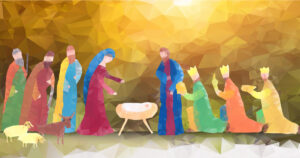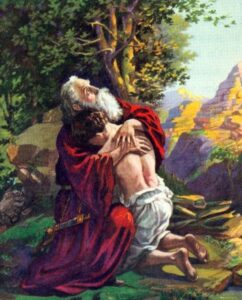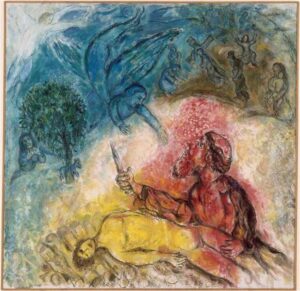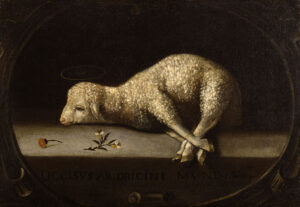Most of us are familiar with the account of Abraham and Isaac and how God put Abraham’s faith to the test. Abraham’s obedience is a lesson for all of us. Yet, did you know that this story also represents the death, burial, and resurrection of Jesus? In this often misunderstood story, Jesus was both pictured and promised through Isaac.
God promised Abraham that he would have a son through Sarah, his wife (Genesis 17:16), and instructed Abraham to name him Isaac (Genesis 17:19). Through this son, God promised Abraham that He would bless his descendants and, eventually, the entire world (Genesis 17:21, Genesis 12:3).
God did what He said He would do. Sarah became pregnant and had Isaac, a child of promise. Sometime later, when Isaac had become a young man, God decided to test Abraham’s faith by asking Abraham to take Isaac and offer him as a sacrifice. Abraham was willing to do this because he trusted God and believed God’s promises. When God saw that Abraham would not withhold his son, He stopped Abraham and provided a substitution, a ram.
There are many similarities between Isaac and Jesus. Here, we will discuss ten of them. These parallels help us know and understand Jesus better.
Isaac and Jesus are both children of promise, miraculously conceived
 Although a virgin, Mary conceived Jesus through the power of the Holy Spirit (Luke 1:30-35), just as foretold in Isaiah 7:14. Likewise, Isaac was miraculously conceived. When Isaac was born, his mother, Sarah, was 90, well past her childbearing years, and his father, Abraham, was 100 (Genesis 17:17, 21:5).
Although a virgin, Mary conceived Jesus through the power of the Holy Spirit (Luke 1:30-35), just as foretold in Isaiah 7:14. Likewise, Isaac was miraculously conceived. When Isaac was born, his mother, Sarah, was 90, well past her childbearing years, and his father, Abraham, was 100 (Genesis 17:17, 21:5).
Not only were both Jesus and Isaac miraculously conceived, but both were the long-awaited fulfillment of a promise of God. Isaac was the son God had promised Abraham many years earlier, the son through which all the nations of the earth were to be blessed. Isaac’s miraculous birth pictured Christ’s birth, which would occur over a thousand years later. Jesus was the fulfillment of that promise to Abraham.
The author of Hebrews explains the promise and miracle like this: “By faith, Sarah herself also received strength to conceive seed, and she bore a child when she was past the age, because she judged Him faithful who had promised. Therefore from one man, and him as good as dead, were born as many as the stars of the sky in multitude—innumerable as the sand which is by the seashore” (Hebrews 11:11-12).
Isaac and Jesus are both their father’s “only sons”

Just as God offered His only Son, Jesus, Abraham offered his only Son, Isaac, as a sacrifice. John 3:16 says about Jesus, “For God so loved the world, that he gave his only son.” In Genesis 22:2, God said to Abraham about Isaac, “Take now your son, your only son, whom you love, Isaac, and go to the land of Moriah, and offer him there as a burnt offering on one of the mountains of which I will tell you.”
We know that Isaac wasn’t the only son of Abraham; Isaac had Ishmael (Genesis 16:15). Why then did God refer to Isaac as Abrahams’s only son?
The New Testament helps answer this question in Hebrews 11:17-18. “By faith Abraham, when he was tested, offered up Isaac, and he who had received the promises offered up his only begotten son, of whom it was said, “In Isaac your seed shall be called.” Here, son is qualified with “only begotten.” “Only begotten” is the Greek word “monogenés,” which means one of a kind or unique. Isaac was “one of a kind” in that he was the only promised son through whom the seed, Jesus Christ, would come; he was the only child of the promise.
Similarly, Jesus is referred to as the “only begotten” Son of God in several places, including 1 John 4:9 and John 1:14. Bodie Hodge points out that Jesus Christ is referred to as the only begotten Son of God, “even though others are called the sons of God (e.g., Adam in Luke 3:38 and Christians in Galatians 3:26). Jesus is the unique and special Son of God—God who became a man.”
Isaac and Jesus are offered in sacrifice by their fathers who loved them
 Jesus and Isaac’s loving fathers offered their sons as a sacrifice. Just as God, the Father, offered Jesus as the “atoning sacrifice for our sins” (1 John 4:10), Abraham offered Isaac as a burnt offering (Genesis 22:9-10). God went through with the sacrifice of His Son but stopped Abraham from sacrificing Isaac by providing a substitute (Genesis 22:12).
Jesus and Isaac’s loving fathers offered their sons as a sacrifice. Just as God, the Father, offered Jesus as the “atoning sacrifice for our sins” (1 John 4:10), Abraham offered Isaac as a burnt offering (Genesis 22:9-10). God went through with the sacrifice of His Son but stopped Abraham from sacrificing Isaac by providing a substitute (Genesis 22:12).
God loved His son Jesus (John 3:35) but was willing to sacrifice Him to save the world. Abraham also loved his son, Isaac, and was ready to sacrifice him because he “reasoned that God could even raise the dead, and so in a manner of speaking he did receive Isaac back from death” (Hebrews 11:19).
Isaac and Jesus are offered in sacrifice in the same place
God instructed Abraham to take Isaac to the region of Moriah to a mountain God would show him (Genesis 22:2, 14). Near Moriah, where Abraham later offered up Isaac, this place was the future site of the Jewish temple Solomon built (2 Chronicles 3:1) and was located around 300 meters from where Jesus was crucified.
God did not randomly choose Mount Moriah for Isaac’s sacrifice. He had a plan and a purpose. He wanted a place where He would provide a sacrifice for our sins, not once but twice. First, when He provided a substitute for Isaac in the form of a ram, and second, when he offered up His Son Jesus as a substitute for us taking the punishment of our sins. Jesus died a sacrificial lamb.
Isaac and Jesus are to be a sacrificial lamb of God

God told Abraham to take Isaac, his son, and sacrifice him as a burnt offering (Genesis 22:2). As Isaac and Abraham went together to make this sacrifice, Isaac said, “The fire and wood are here, but where is the lamb for the burnt offering?” Abraham answered, “God himself will provide the lamb for the burnt offering, my son.” (Genesis 22:7-8). As Abraham was about to sacrifice Isaac, God stopped him. In Isaac’s place, God instead provided a ram for the sacrifice. Abraham called this place of substitution and sacrifice “The Lord Will Provide.”
God did not provide a lamb as Abraham had said but instead provided a ram. Who then was this lamb that Abraham said God would provide? When prophesying about the coming Messiah, Isaiah described the Messiah as being “led like a lamb to the slaughter” (Isaiah 53:7). When he saw Jesus for the first time, John the Baptist said, “Look, the Lamb of God, who takes away the sin of the world” (John 1:29).
Perhaps God gave Abraham a glimpse of the sacrificial lamb that He would eventually provide on the mountain that day, a picture of Jesus? After all, Jesus said of Abraham in John 8:56, “Your father Abraham rejoiced at the thought of seeing my day; he saw it and was glad.”
Jesus was the ultimate sacrificial lamb. He was the lamb God provided. Matt Seger, in his blog, “Ram or Lamb,” sums it up like this “God provided a ram to rescue Isaac from physical death. But He provided Jesus the Lamb to rescue us from spiritual death—eternal separation from God.”
Isaac and Jesus carry wood on their back to die

Both Isaac and Jesus, the sons of promise, carried the wood for their own sacrifice. “Abraham took the wood for the burnt offering and placed it on his son Isaac…” (Genesis 22:6) and they went on up the mountain. Jesus “carrying his own Cross, he went out to the place of the Skull (which in Aramaic is called Golgotha)” (John 19:17).

Both sons were bound and placed on top of the wood. “…Abraham…bound his son Isaac and laid him on the altar, on top of the wood” (Genesis 22:9). After they had nailed him [Jesus] to the Cross, the soldiers gambled for his clothes by throwing dice. Then they sat around and kept guard as he hung there (Matthew 27:35).
Isaac and Jesus were obedient to their fathers to the point of death
Both Isaac and Jesus willingly allowed their fathers to offer them as a sacrifice. Many think Isaac was a young boy when Abraham took him up the mountain, but he was not; he was a young adult man.
Isaac could have easily resisted Abraham, who was well over 100 years old, but there is no evidence that he did. When Isaac didn’t see the sacrificial lamb, he asked Abraham where it was. Abraham responded that God would provide the lamb. Isaac didn’t question Abraham again. He trusted Abraham’s assurance that God would provide. Isaac gives us a picture of submission to his father that later Jesus would walk out in his life.
Jesus knew that it was His Father’s will that he die on the Cross. Jesus also questioned His Father at the Garden of Gethsemane “My Father, if it is possible, let this cup pass from Me; yet not as I will, but as You will.” When God answered by not taking the cup of sacrifice away from Him, Jesus willingly went with the soldiers who led him to his death like a “sheep to slaughter, and as a lamb before its shearer is silent” (Acts 8:32). Jesus submitted to the will of His father.
Isaac and Jesus had a three-day experience
Both Isaac and Jesus were “resurrected” or given back to their fathers on the third day. Three days passed from when God commanded Abraham to sacrifice Isaac to the time God provided a substitute, the ram. On the third day, God provided a substitute for Isaac, and he was returned to his father.
Jesus was in the grave for three days before being brought back from the dead to His Father. (Mark 16:6, Luke 24:6-7 1st Corinthians 15:4) just as prophesied in Psalm 16:9:10: “…you will not abandon me to the realm of the dead, nor will you let your faithful one see decay.” Isaac’s three-day journey from death to life sketches a clear picture of Jesus’ death and resurrection.
Jesus foretells his own three-day experience in Matthew 12:40, “For as Jonah was three days and three nights in the belly of a huge fish, so the Son of Man will be three days and three nights in the heart of the earth.”
Both narratives conclude God will provide
 In both accounts of Isaac and Jesus, the story ends with the message that God will provide. Abraham told Isaac that God would provide, and He did. God offered a substitute for Isaac, a ram. Specifically, Moses tells us that “Abraham looked up and there in the thicket he saw a ram caught by its horns. He went over and took the ram and sacrificed it as a burnt offering instead of his son” (Genesis 22:13-14).
In both accounts of Isaac and Jesus, the story ends with the message that God will provide. Abraham told Isaac that God would provide, and He did. God offered a substitute for Isaac, a ram. Specifically, Moses tells us that “Abraham looked up and there in the thicket he saw a ram caught by its horns. He went over and took the ram and sacrificed it as a burnt offering instead of his son” (Genesis 22:13-14).
God’s provision of a ram as a substitute for Isaac is a clear picture of the substitute God would provide for us, a sacrifice for our sin, Jesus Christ. (Romans 3:25).
Both fathers anticipated their son’s resurrections
Before Abraham took Isaac up the mountain to sacrifice, he said to his servants, “Stay here with the donkey while I and the boy go over there. We will worship and then we will come back to you” (Genesis 22:5). Abraham expected him and Isaac both to return.
Additionally, Abraham knew what God had promised, that Sarah would have a son, he would be called Isaac, and through Isaac, there would be an everlasting covenant (Genesis 17:19). If Abraham believed that he would kill Isaac and that Isaac would live and continue Abraham’s line, he must have believed God would resurrect him.
Hebrews 11:17-19 says, “It was by faith that Abraham offered Isaac as a sacrifice when God was testing him. Abraham, who had received God’s promises, was ready to sacrifice his only son, Isaac, even though God had told him, “Isaac is the son through whom your descendants will be counted.” Abraham reasoned that if Isaac died, God was able to bring him back to life again. And in a sense, Abraham did receive his son back from the dead.”
God, of course, is omniscient; He knows the beginning from the end, so he knew that He would resurrect Jesus.
Both Isaac and Jesus were raised from the dead
Isaac was dead to Abraham the minute God gave him the command to sacrifice his son. Hebrews 11:19 puts it this way, “Abraham reasoned that if Isaac died, God was able to bring him back to life again. And in a sense, Abraham did receive his son back from the dead.” When God stopped Abraham from sacrificing Isaac and Isaac got up from the altar, he was, in a sense, raised from the dead. This is a picture of Jesus coming out of the grave after three days.
Isaac is a picture of each of us
Isaac, throughout the entire story, had been a picture of Christ. However, the moment God provided the substitute ram, the view shifted, and Isaac became a picture of each of us.
As Abraham “reached out his hand and took the knife to slay his son,” the angel of the Lord called out to him, “Abraham!, Abraham!” “Do not lay your hand on the boy, “he said. “Do not do anything to him. Now I know that you fear God because you have not withheld from me your son, your only son.” (Genesis 22:10-12).
Isaac was not sacrificed because one day Jesus Christ would be. God provided a substitute for Isaac, and He has provided a substitute for each of us in Jesus Christ. In Genesis 22:14, Abraham called this place of provision Jehovah-Jireh, meaning “The God who is sufficient; the God who will provide.” The Lord did provide; He provided Jesus as the ultimate, final sacrifice on this same mountain years later.
Certainly, Abraham is an example to all of us. Although God tested Abraham’s faith with the one thing he loved the most, his son Isaac, Abraham still trusted God enough to give him Isaac. But the story of Abraham and Isaac offers us much more than that. It offers us a complete picture of the Christ who would one day be offered as atonement for our sins, die, and be resurrected to save us all!
Author
-
I am a truth seeker by nature. My passion is studying God's Word and sharing His Truth with others.
View all posts





2 Responses